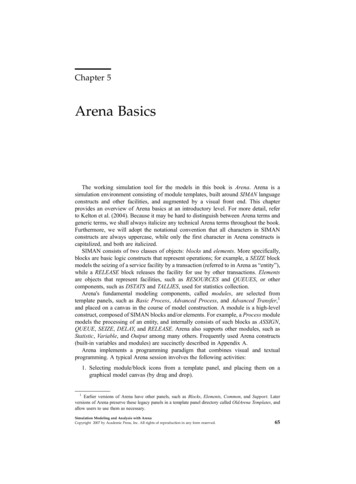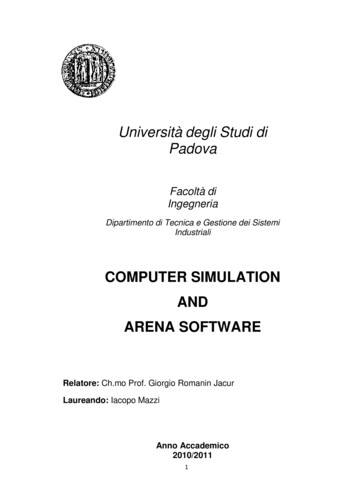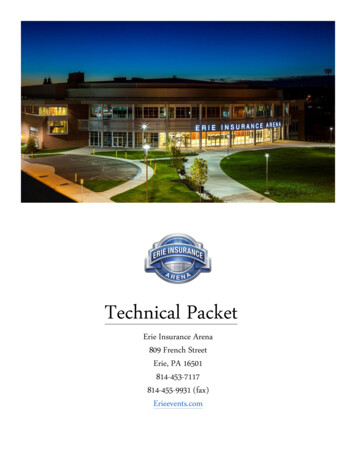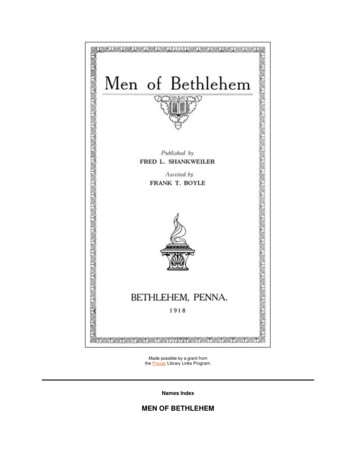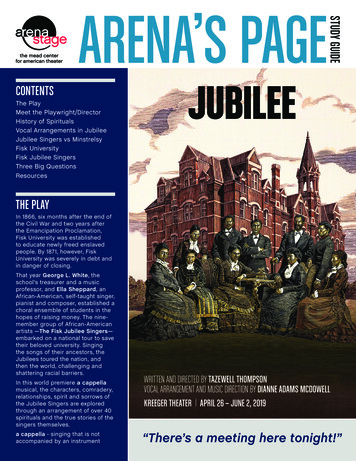
Transcription
CONTENTSThe PlayMeet the Playwright/DirectorHistory of SpiritualsVocal Arrangements in JubileeJubilee Singers vs MinstrelsyFisk UniversityFisk Jubilee SingersThree Big QuestionsResourcesSTUDY GUIDEARENA’S PAGEJUBILEETHE PLAYIn 1866, six months after the end ofthe Civil War and two years afterthe Emancipation Proclamation,Fisk University was establishedto educate newly freed enslavedpeople. By 1871, however, FiskUniversity was severely in debt andin danger of closing.That year George L. White, theschool’s treasurer and a musicprofessor, and Ella Sheppard, anAfrican-American, self-taught singer,pianist and composer, established achoral ensemble of students in thehopes of raising money. The nine-‐member group of African-Americanartists —The Fisk Jubilee Singers—embarked on a national tour to savetheir beloved university. Singingthe songs of their ancestors, theJubilees toured the nation, andthen the world, challenging andshattering racial barriers.In this world premiere a cappellamusical, the characters, comradery,relationships, spirit and sorrows ofthe Jubilee Singers are exploredthrough an arrangement of over 40spirituals and the true stories of thesingers themselves.a cappella - singing that is notaccompanied by an instrumentWRITTEN AND DIRECTED BY TAZEWELL THOMPSONVOCAL ARRANGEMENT AND MUSIC DIRECTION BY DIANNE ADAMS MCDOWELLKREEGER THEATER APRIL 26 — JUNE 2, 2019“There’s a meeting here tonight!”
MEET THEPLAYWRIGHTHISTORY OFSPIRITUALSSpirituals are the religiousfolk songs created and firstsung by enslaved AfricanAmericans. “Swing Low, SweetChariot;” “Joshua Fit the Battleof Jericho” and “Wade in theWater” are some of the bestknown spirituals. Many Americans from all ethnic backgrounds can remember“growing up” with these songs. Spirituals are regarded as the first signaturemusic of America. They are the roots of rock, the blues, rap and R&B.TAZEWELL THOMPSON“ I’d never heard those songsbefore and that’s my culture! And theywere beautiful I wanted to learnmore about where they [spirituals]came from and why they were sung. Iwanted to create a history for myself.”Tazewell Thompson is an internationaltheater and opera director and anaward-winning playwright. Jubileeis Thompson’s 20th Arena Stageproduction. His play Constant Star hashad 16 productions in major nationaltheaters and his play Mary T & LizzyK, commissioned by and produced atArena Stage, was the recipient of theEdgerton Foundation New AmericanPlay Award.Growing up in the Roman CatholicChurch, Tazewell Thompson grew upsinging Gregorian chants and Irish folksongs. His first experience hearing thespiritual songs of his ancestors waswhen he was in high school and hisgrandmother took him to her Baptistchurch. He was blown away by thepowerful voices, melody, rhythm andspirit of the church. Eager to hear andlearn more music from his culture,Thompson continued going to hisgrandmother’s church.He later learned about the FiskJubilee Singers from a PBS specialand started researching the group.Over years, Thompson amassed alibrary of spirituals, but was unsurewhat shape the story should take. Withthe premiere of Jubilee, Thompsoninvites audiences to learn about theintimate and dynamic lives of the FiskJubilee singers through their music.Spirituals are bound to the ongoing struggle for freedom by women andmen in the enslaved African-American community. After newly capturedAfricans were loaded like cattle into the holds of slave ships, enduringthe Middle Passage (the voyage from the west coast of Africa to theAmericas), singing was one of the few protest tools they had. Duringslavery, the songs may have been used as codes to help slaves escapevia the Underground Railroad. They were also important during the CivilRights Movement as many of the spirituals were sung at protests whereAfrican Americans demanded racial equality.According to the article “African American Spirituals” from the Library ofCongress, “The spiritual form has its roots in informal gatherings of slavesin ‘praise houses’ and outdoor meetings. At the meetings, participantswould sing, chant and dance Spirituals also come from the ‘ring shout,’a shuffling circular dance to chanting and clapping that was commonamong enslaved people on plantations.”In terms of structure, “spirituals are traditionally sung in a call andresponse form, with a leader improvising a line of text and a chorusproviding a refrain in unison. Many spirituals, known as ‘sorrow songs,’ areslow and sad. Other spirituals are more joyful; ‘jubilees,’ or ‘camp meetingsongs,’ are fast and rhythmic.”According to scholar Sandra Jean Graham, when these private songsbegan being publicly performed in concert halls, musicians started totranscribe and formally arrange the music. Some arrangers, like GeorgeWhite of Fisk University, imposed standard English and precise parts.Others, like Thomas Fenner of Hampton Institute, retained the original feelof the spirituals, keeping dialect, vocal slides, space for improvisation andusing up to seven vocal parts.READThe Souls of BlackFolk Chapter XIV (14)The Sorrow Songsby W.E.B. DuBoishttps://bit.ly/2K5PCqEThe term “spiritual” comesfrom the King James Bibletranslation of Ephesians5:19: “Speaking toyourselves in psalms andhymns and spiritual songs,singing and making melodyin your heart to the Lord.”
VOCAL ARRANGEMENTS IN JUBILEEThe music in Jubilee is sung a cappella. This means there is no instrumentaccompanying the singers. Dianne Adams McDowell is the music director andvocal arranger for Jubilee.She says that in an a cappella piece the voices are everything. “They are theband, the voices and the actors. When you are working with a cappella music,the voice must be the foundation for the house not only the shutters.”JUBILEE SINGERS VS MINSTRELSYThe Jubilee Singers provided a positive and empowering portrayal of AfricanAmerican culture at a time when a popular form entertainment in America wasminstrelsy, which mocked and demeaned African-American life.Minstrel shows portrayed black people as dumb, lazy, buffoonish and delightedto work for white people. The iconic makeup of the minstrel clown was blackface(burnt cork or coal) with white circles around the eyes and mouth. They wouldperform in blackface and dance “jigs” that mocked African dance. White performerswould also sing “coon songs” with lyrics about how black people missed the cottonfields and slavery. At first only white performers would participate in minstrel shows,but the form was so popular that African Americans would wear blackface andperform in minstrel shows as well. Most white audiences had never experienced anauthentic portrayal of African-American life or artistry.As the Jubilee Singers toured the U.S. they had to challenge and break theminstrel portrayals with each song and performance. White audiences wereoften shocked that the singers were black people. Some would even comeup and touch their faces to check for blackface makeup. Although the JubileeSingers were harassed and met with racism, they continued to tour, proudlypresenting true African-American artistry.FISK UNIVERSITYOriginally known as the “Fisk Free ColoredSchool,” Fisk University was established in 1865.It was named in honor of General Clinton B. Fisk,who provided the site in former Union Army barracks. It was sponsoredby the American Missionary Association.Classes began January 9, 1866 and the first students ranged in agefrom 7 to 70. Tuition was 12 per year. Many students there studied to beteachers or ministers. Before Emancipation, slaves could be beaten orkilled for learning to read or write. Now education was available, and, in thatopportunity, newly freed people saw the hope of greater freedom. After itopened, students dug up chains and shackles, discovering Fisk was alsothe former site of a slave auction. They sold these tools of oppression forscrap metal and bought books and other instruments of learning.Fisk was the first of the southern HBCUs to gain accreditation in 1930,and has had several significant alumni, including W.E.B. Du Bois, D.C.Mayor Marion Barry, poet Nikki Giovanni, U.S. Representative John Lewisand journalist Ida B. Wells.HBCU – Historically Black Colleges and UniversitiesLEADERS OF THEJUBILEE SINGERSGEORGE L. WHITEGeorge Leonard Whitewas born in New York,where his family andfriends were involvedwith the UndergroundRailroad. After being wounded in theCivil War, White became a bandmasterfor his regiment. After the war,White was hired at Fisk Universityas treasurer and he also joined thefaculty as a music teacher. White’smusical ability and his creative natureinspired him to form the Fisk JubileeSingers.ELLA SHEPPARDElla Sheppard wasthe matriarch of theFisk Jubilee Singers.She received 12 pianolessons from a whiteteacher in secret andthen taught herself how to composemusic. Sheppard also taught herselfhow to read and write. After herfather’s death from cholera, shesupported herself, her stepmotherand her half-sister by teaching at aschool for formerly enslaved people,before coming to Fisk University.George White appointed her theaccompanist and assistant choraldirector. She accompanied the choir,oversaw many of their rehearsals,conducted the Jubilees from herposition among the singers onstage, and collected and transcribedspirituals until the troupe’s repertoirenumbered over a hundred. Becauseshe was a black woman she couldnot be the official face of the JubileeSingers. However, in Jubilee, theactress that plays Ella also playsGeorge White; symbolizing howintegral her contribution was to thesuccess of the Jubilee Singers.See page 5 for original and additionalJubilee Singer bios
CONDITIONSON TOURFISK JUBILEE SINGERSThe original Fisk Jubilee Singers introduced “Negro spirituals” to the worldand were instrumental in preserving this unique American musical tradition.The original Jubilee Singers were hand selected by George White and EllaSheppard. Later, students could audition for spots.When the Jubilee Singers started touring, they sang songs such as ariasand European hymns. After a concert in Ohio, the group passed a collectionplate. In the plate was a note that stated they could keep the attached 6 if they never came back to the area “singing our songs,” meaning theEuropean classics. While waiting for their train, White heard the choirmembers singing the songs of their parents and grandparents – spirituals.White noticed that not only did they sing these spirituals beautifully, but theysang them with a sacredness, with reverence and with heart. It was then thatWhite and Sheppard decided that the Jubilee singers would tour singingNegro spirituals.In 1873 the group grew to 11 members and toured Europe for the first time.Funds raised that year were used to construct the school’s first permanentbuilding, Jubilee Hall. This beautiful Victorian Gothic building houses a floorto-ceiling portrait of the original Jubilee Singers, commissioned by QueenVictoria as a gift from England to Fisk after they performed for her.After the success of their first tours, the school’s administrationarranged more rigorous fundraising tours, which left the singers sick andexhausted. In 1878 the group disbanded. A year later, however, a secondgroup with new members was established. The Fisk Jubilee Singersresumed touring in 1879. The Fisk Jubilee Singers continue to this day,performing at venues across the U.S.WATCHthe JubileeSingers featuredin America’sMusical Journeyhttps://bit.ly/2FOSsLq“The managers were workingthe Jubilees like horses.Touring the small towns of19th-century Britain involvedriding on rattling trainsthrough whose windowsand doors cinders blew. Itmeant waiting in unheatedstations; walking throughunpaved, muddy streets;singing without amplificationin vast halls and draftychurches; sleeping on dampbeds in country hotelswhose fare was coarse andmeager. It meant keepingup the standard of theirreputation in performancesthat demanded suchphysical, intellectual andpsychological exertion thatthey often left the stagedrenched in perspiration.To prove the intelligence,dignity and educability ofthe American freedman, theywere to behave all the whilewith impeccable decorum.”— Journalist Andrew Ward from“On the Road to Freedom: TheContracts of the Fisk JubileeSingers” by Sandra Graham.LISTENto a recordingof the JubileeSingers fromthe period.https://bit.ly/2IarZLeJubilee Hall at Fisk University was the first permanentbuilding built in the South for the education of AfricanAmericans. The Jubilee Singers’ 1870s tour of Europeraised 150,000 to finance the building.
THE SINGERSMost of the Jubilee Singers were either born into slavery or thechildren of freed slaves. Though they gave their voices to go ongrueling tours to support their school, only one of the originalJubilee singers obtained a college degree from Fisk University.ORIGINAL JUBILEE SINGERSMAGGIE PORTER — SopranoWith her extraordinary soprano voice, MaggiePorter became the diva of the Fisk JubileeSingers. White once banished her from thegroup but found he could not manage withouther voice. She performed in all three Fisktroupes between 1871 and 1878.JENNIE JACKSON — SopranoJennie Jackson’s mother was so protective ofher daughter’s voice, she wouldn’t let her sing inchoirs growing up. Jackson was among the firststudents admitted to Fisk. She had one of thebest voices in the troupe, dazzling audiencesabroad and actually having to use an umbrella topush past them in the street. She remained with the troupe forfive years.MINNIE TATE — ContraltoMinnie Tate was first taught by her mother, whoopened her home to teach other black children.She was the youngest of the singers on the tourto Great Britain. After the tour, she had to giveup singing due to vocal stress and exhaustion.BENJAMIN HOLMES — TenorWhen Benjamin Holmes enrolled at Fisk, he hadalready taught himself reading and mathematics.At Fisk, he studied Latin, history and pedagogy. Tocover his tuition, he taught at a rural high schoolfor 30/month. A news correspondent, he wroteweekly articles about the group while it toured.THOMAS RUTLING — TenorThomas Rutling came to Fisk, working and thenstudying as he could. He performed with thegroup for seven years, through all three tours.He refused to return to America and its racismafter the last European tour.ISAAC DICKERSON — BassIsaac Dickerson was among the first to join theFisk Jubilee Singers. During the tour of Britain,Dickerson impressed the Dean of Westminster,who then sponsored Dickerson’s education atthe University of Edinburgh. Dickerson quit thetroupe to pursue his studies.GREENE EVANS — BassGreene Evans paid his way through Fisk workingas a groundskeeper and taught at a small schoolduring the summer. Quitting the troupe just asit was beginning its second tour, Evans left FiskUniversity and returned to Tennessee, where hewas elected to the Tennessee General Assembly.ADDITIONAL JUBILEE SINGERSGEORGIA GORDON — SopranoGeorgia Gordon Taylor, a native Nashvillian,entered Fisk in 1868 and remained a studentin the literary department. She trained with theoriginal troupe and became a Jubilee Singer in1872.MABEL LEWIS — ContraltoMabel Lewis was born ‘Marie’ Lewis and broughtup by a wealthy family. At 10, she ran awayfrom the family and drifted from place to place,changing her name to Mabel. She joined theJubilee Singers in 1872, performing with themuntil 1880.AMERICA ROBINSON — ContraltoAmerica Robinson attended the Fisk ColoredSchool from its opening day and was recruitedto join the Jubilee Singers’ third tour. She wasamong those who demanded better treatmentfor the singers, winning better pay and workingconditions. She was the only group member toobtain her bachelor’s degree from Fisk.FREDERICK J. LOUDIN — BassAt 34, Frederick J. Loudin was the troupe’soldest member and had a 2 ½-octave range. Hefearlessly spoke out against the segregationthe Jubilee Singers encountered. After Whitedisbanded his troupe, Loudin formed his owngroup with which he traveled the world.EDMUND WATKINS — BassEdmund Watkins toured with the Jubilee Singersin 1873 until their disbandment in 1878. Hereplaced Greene Evans and sang bass.Choose a memberof the Fisk JubileeSingers and researchand present theirbiography.
PRESS CLIPPINGSFROM THE TOURSHELPFUL HINTSFOR THEATER AUDIENCESAs an audience member at the theater,YOU are part of the show! Just as yousee and hear the actors onstage, theycan see and hear you in the audience.To help the performers do their best,please remember the following:A newspaper clipping from the Jubilee Singers’ European Tour.RESOURCES“The Jubilee Singers: Sacrifice andGlory” PBS.orghttps://to.pbs.org/2WE1Msj“African American Spirituals” Libraryof Congresshttps://bit.ly/2GwruIj“Our History” k Jubilee Singers” www.Fisk.eduhttps://bit.ly/2VmkVP6“National Medal for the Arts” NEA.comhttps://bit.ly/2Uq208THistory of Fisk Universitywww.Fisk.eduhttps://bit.ly/2K21n1y“The Spirituals Project” atThe University of Denverhttps://bit.ly/2WFNRlv“Jubilee Singers Archives 1858-1924”at Fisk Universityhttps://bit.ly/2IoCz11“How African-American SpiritualsMoved from Cotton Fields to ConcertHalls” What It Means to be Americanhttps://bit.ly/2uUlg00 Arrive at least 15 minutes early. Visit the restroom before theshow starts. Sit in the exact seat on your ticket.Ask the usher for help finding it. Before the show begins, turn off yourphone, watch alarms and any otherelectronic devices. If anything ringsby accident, turn it off immediately. Do not use your phone for texts,calls, games or pictures. You cannot take pictures or makerecordings in the theater, evenbefore or after the play. There is no food allowed inthe theater. Do not talk, whisper, sing or hum,unless invited by the performers todo so. Keep your feet on the floor and offthe seat in front of you. Avoid getting up during a show. Ifyou must leave, wait for a scenechange and exit quietly and quickly. Respond to the show; you canlaugh, cry and gasp. However, don’trepeat lines out loud or talk to theperformers on stage. Be sure to applaud at the end!“On the Road to Freedom: TheContracts of the Fisk Jubilee Singers”by Sandra Graham. American Music.Vol. 24, No. 1 (Spring, 2006.)“History of Minstrelsy” University ofSouth Florida Librarieshttps://bit.ly/2HY1OYO1101 Sixth Street SWWashington, DC 20024Phone: 202-554-9066Fax: 202-488-4056What is thelegacy of the FiskJubilee Singers?What are thecentral themesof Jubilee?What is therole of musicin identity?Written by Morgan Charéce Halland Rebecca CampanaVisit www.arenastage.org for moreinformation on Arena Stage productionsand educational opportunities.
authentic portrayal of African-American life or artistry. As the Jubilee Singers toured the U.S. they had to challenge and break the minstrel portrayals with each song and performance. White audiences were often shocked that the singers were black people. Some would even come up and touch their faces to check for blackface makeup. Although the .
